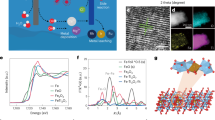Abstract
IN an earlier paper1, I have reported the enormous development of the 'chloride-secreting cells' in the branchial lamellæ of the paradise fish acclimatized in a table-salt solution of salinity 27·3 per cent. As these cells are very scanty and rudimentary in the control specimens, the conclusion was drawn, in harmony with the suggestion of Keys and Willmer2, that they are intimately concerned in the undertaking of osmotic regulation against a hypertonic external medium. The question now arises as to whether the secretory activity of these cells is restricted to chloride alone, as their name implies, or is of a more general nature, capable of turning out salts other than chloride.
This is a preview of subscription content, access via your institution
Access options
Subscribe to this journal
Receive 51 print issues and online access
$199.00 per year
only $3.90 per issue
Buy this article
- Purchase on SpringerLink
- Instant access to the full article PDF.
USD 39.95
Prices may be subject to local taxes which are calculated during checkout
Similar content being viewed by others
References
Liu, C. K., Sinensia, 13, 15 (1942).
Keys, A. B., and Willmer, E. N., J. Physiol., 76, 368 (1932).
Keys, A. B., Z. vergl. Physiol., 15, 364 (1931).
Smith, H. W., Amer. J. Physiol., 93, 480 (1930).
Author information
Authors and Affiliations
Rights and permissions
About this article
Cite this article
LIU, C. Sodium Sulphate as an Agent Causing the Development of the 'Chloride-secreting Cells' in Macropodus. Nature 153, 252 (1944). https://doi.org/10.1038/153252a0
Issue date:
DOI: https://doi.org/10.1038/153252a0



